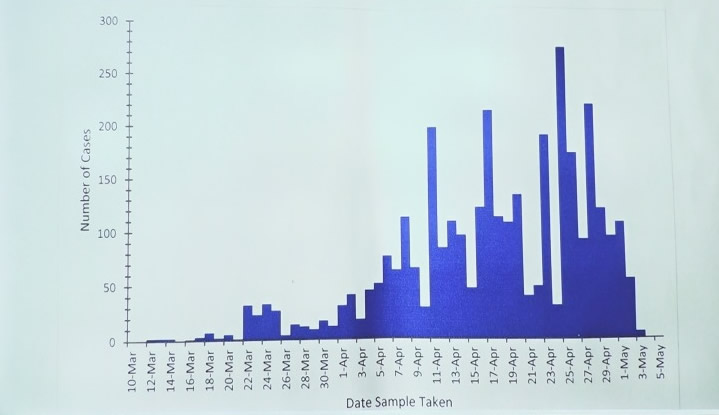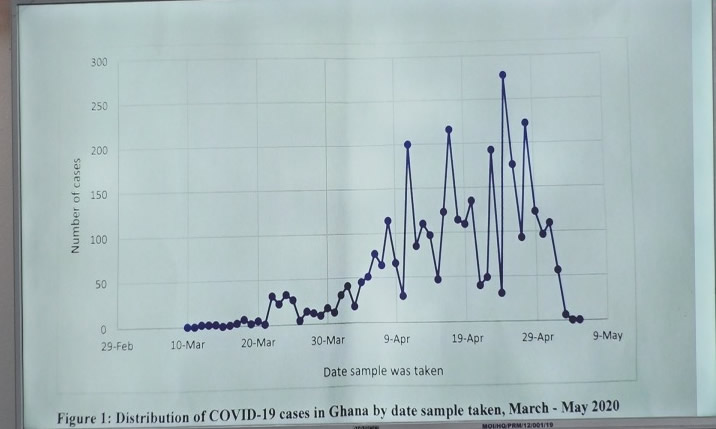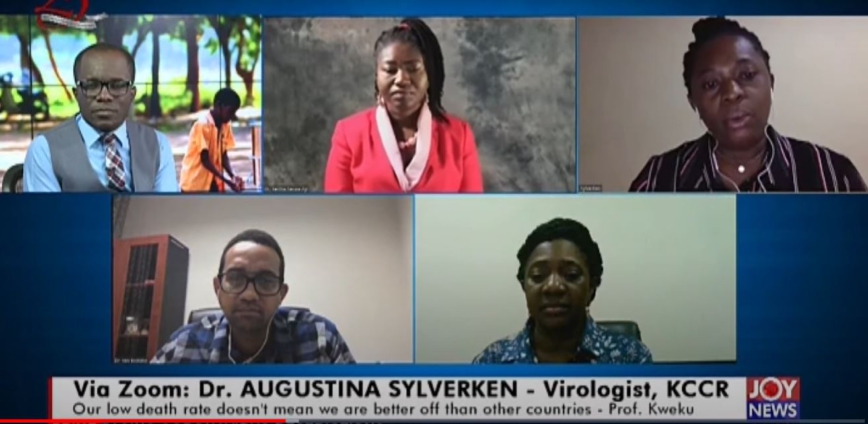
Audio By Carbonatix
A virologist with the Kumasi Centre for Collaborative Research (KCCR) has said Ghana’s number of the novel coronavirus cases has not yet reached its peak.
Dr Augustina Angelina Sylverken believes the idea in relation to Ghana’s situation is a myth which must be shelved at this point.
This revelation goes contrary to information presented to the Ghanaian populace by the Ghana Health Service.
At a press briefing on May 5, Director of Public Health for GHS, Dr Badu Sakordie sought to suggest that the infection curve, at the time when the case count stood at 2,719, had peaked.
Following that announcement, some public health experts challenged the Service’s position.
GHS subsequently released two graphs as data based on which their conclusions were made in order to drum home their point.

Director-General of GHS Dr Patrick Aboagye said, “we peaked around the 25 of April and since then the numbers have continued to come down until May 6.
“So that is showing that of the positivity, since peaking on April 2, we have consistently recorded a decline until today, May 7."

Since this announcement, Ghana’s number of Covid-19 infections has shot up to 4,700 with 22 deaths and 474 recoveries as of May 11.
Speaking on JoyNews' PM Express, the virologist and Theoretical and Applied Biology lecturer at the Kwame Nkrumah University of Science and Technology (KNUST) described the idea of Ghana reaching the peak of its Covid-19 infections as a myth.
“Once you peak you know that your health system will be overwhelmed and people will be rushing all over. They will require ICU management and we know that even when people have been put on ventilators,” Dr Sylverken explained.
She emphasised that: “We may want to gradually move from this - I don’t know whether to call it a myth - that we have peaked because even after we claimed to have peaked, look at the numbers we are recording. The interesting thing is that when we test, we find.”
The virologist also posited that this was not the time to be rest on our oars as she stressed the need for “heavy preventive measures as always recommended i.e the washing of hands and change in attitudes.”
Her position was seconded by Dr Bertha Serwa Ayi, a specialist in Clinical Infectious Diseases who posited that a declaration of a peak in any outbreak comes with its attendant implications in terms of policy and must not be taken for granted.
“A peak means that we are getting fewer cases so we are about to ease our non-pharmacological interventions like people can go back to school and church,” she said.
According to Dr Ayi, “for you to peak it means you have reached your maximum number of cases and the rate at which your number is decreasing is increasing. But if we report 533 within one day – we understand that it’s from April - then clearly we have not peaked.

The Adjunct Assistant Professor of Medicine at the Kansas Health Science Centre also highlighted a criterion necessary to effectively say that a country has peaked and is on the road to recovery.
She enumerated the evidence of low transmission, ability to detect ever case as soon as possible, a good case management regime, individual behavioural change and effective community engagement as being crucial to such a declaration.
Latest Stories
-
KAAF University donates to Widows, urges Public to end Discrimination against Elderly Widows
7 minutes -
NAIMOS task force disrupts illegal mining operations along Ankobra River
17 minutes -
President’s New Year message lacked hope and sincerity – NPP’s Senyo Amekplenu
51 minutes -
Ebo Noah remanded pending psychiatric exam, to reappear on January 15
1 hour -
Our public university system is falling down
1 hour -
Ho Central Mosque under heavy security, worshippers forced to pray outdoors
2 hours -
An open letter to H.E. John Dramani Mahama: The audacity of the third shift
2 hours -
A new era of healthcare dawns in Kintampo: Mary Queen of Love Medical Hospital opens its doors
3 hours -
NDC gov’t has demonstrated strong fiscal discipline – Abdulai Alhassan
3 hours -
Heavily armed Burkinabè soldiers arrested in Ghana
3 hours -
Tamale Chief commends IGP Special Operations Team for crime reduction efforts
4 hours -
None of NPP’s 5 flagbearer aspirants is credible – Abdulai Alhassan
4 hours -
Police arrest suspect for unlawful possession and attempted sale of firearm
5 hours -
3 arrested in connection with Tema robberies
5 hours -
Your mouth on weed is nothing to smile about
6 hours

